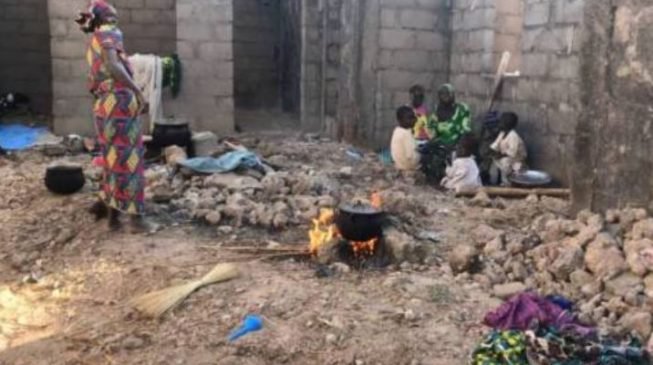Entertainment
Blood thirsty demons of Zamfara (III): Displaced and abandoned, the story 0f 30,000 Zamfarans

BY BANJO DAMILOLA
Zamfara state has been a hotbed of killings and kidnappings. The media is awash with daily reportage of these incidents. These casualities are fathers, mothers, sons and daughters who have been gruesomely uprooted from their families. ‘Blood-Thirsty Demons of Zamfara’ is a four-part series that chronicles the pains, losses and sufferings of families being crushed by the ongoing banditry in the state. Banjo Damilola travelled to the burning spots in Zamfara State to put faces to the ‘figures’ being reported daily.

Aisha coiled up on a mat spread over unlevelled concretes in an uncompleted building. She and her mother share this space with others rendered homeless by banditry. She had been sick for weeks without recourse to serious medical attention. Her mother, Fatima, bent over a pot placed on a homespun cooking apparatus fashioned from tripod stones and faggot. She fanned the dying embers to flame; the ignited fired leaked the pot and heated up its contents. She was making herbal concoction for sick Aisha.
Aisha’s father, and the breadwinner of the family, was killed on his farm in Mallamwa two years ago. With the fall of the village, Fatima took her daughter and the little things they had left and migrated to the town of Anka LGA to live with a relative. But her relationship with the relative soon turned sour and she, together with her daughter, left the relative’s house.
With nowhere to go and no relative around, Fatima took abode in an uncompleted building. “We have lived here for three months. It is all we can afford because we don’t have to worry about paying rent,” Fatima says, justifying living in an unroofed, uncompleted structure with a sick child.
Aisha, eight, was severely sick but the mother said she could not afford to take her to the hospital.
There are thousands of Aisha and her mother in different abandoned and shanty structures all over Zamfara. There are about 30,000 Internally Displaced Persons in the state, according to state emergency management agency.

The state government has no readily-available space to receive the hundreds of victims who flee their villages every day. Of the three known makeshift IDP camps in the state — the uncompleted emir’s palace in Anka LGA, the abandoned government quarters in Maradun LGA, and a primary school in Tsafe LGA — none has the facility to adequately support the traumatised persons who take abode there. Also, the camps cannot sufficiently accommodate the IDPs at the rate people flee their villages.
These three camps, already overpopulated, have no facility to address health emergencies. There are no clinics in the designated camps. Neither are there schools for the thousands of children who wander around the camps.

An abandoned government quarters
At abandoned government quarters converted into a camp in Maradu LGA, over 50 are cramped in a bungalow with six rooms. There was no portable water, no school or clinic for more than 500 people who have taken abode in the crowded resident.
“At least more than 500 people are living in this house,” says one of the residents of Maradu camp. “In each bungalow there are more than 50 people, and the quarters have 10 bungalows.”
Those in the camps in Anka and Maradu received almost no succour from the government. They are left in porous vicinities with no security. An occupant in the camp in Anka said they merely received some grains from the government four months ago. The women in Maradu camp said the building was the only assistance they got from the government; they provide their own water, food and other needs for sustenance.

25 PEOPLE SLEEP IN A SINGLE ROOM
Without sufficient spaces to cater to their housing needs, displaced victims take abode in uncompleted buildings or are forced to take up rents in overpriced apartments that provide nothing commensurate to the amount paid.
In Zurmi LGA, there is no recognised state camp. Shamsiyya Muhammadu, an internally displaced widow, pays N4,000 monthly for a room shared with 25 other people. Shamsiyya has 10 children, which costs her double as she and her children occupy more space.
Shamsiyya left her village after the demise of her husband in December 2017. He died of depression after his ban was burnt with all his harvest for the year.

“My husband died because he lost his farm. The bandits came and burnt all our maize and millet because they said we should not farm,” she says. “He was thinking too much and he died one night. After my husband’s death, I was struggling to do petty business so that I can feed my children but then they [bandits] attacked our village again. People were leaving, so I left too.”
The mother of 10 says she pounds grains in return for some money, just to raise money for her rent.
Musa Kima, another displaced person, lamented how hard it is for fleeing villagers to get apartments in the relatively safer parts of Zurmi.
“You can’t even migrate without renting an apartment,” Musa says. “We meet the village heads and talk to them to help us find for a place to live. I met the village head of Dauran to help me search for a house to live so he is the one that helped me search for the house I am living in. At least 25 people are living in a single room and each of us must pay a rent of N4000 monthly.”

In the store-like, 6 by 7 cuboid shaped room that Kima shares with 25 others and pays N4000 a month for, there was no fan, neither was the room painted. Fitting 10 grown men into the room for a night’x sleep does not look physically possible, but Kima said 25 sleep in there, shoulder to shoulder, every night.
When these issues were put before Zamfara State Emergency Management Agency (ZEMA), the organisation denied culpability. Sanusi Muhammadu Usman, ZEMA’s Executive Secretary, said the agency routinely takes food and clothing material to the various IDP camps in the state.

He claimed that not only does the state government provide reliefs for those in the camps, it also gives succour to families who house displaced persons and those in uncompleted buildings, such as Aisha and her mother. But Aisha’s mother said she received no such help from the government.
Nonetheless, ZEMA admitted that the agency is unable to keep up with the rate of displacement in the state. He said it appears the agency is not doing much because of the fluid nature of the residents.
“As people leave the camp, more people come in,” the ZEMA boss laments. “Just last week, I received a message that we had about 10,000 IDPs in Anka, so the food I took for maybe 2,000 IDPs can sustain them for four months. And now that there is another displacement, about 30,000, they can finish the food anytime.”
RICHES TO RAGS

“I had three farms, about 5 hectares with which I can have more than 100 plus bags of millets and guinea corns at the end of every raining season. Now, I don’t have anything, I don’t have a cup of millet to feed my wife and children now. Everything I have is gone.” These were the agonising words of Usman Namairo.
Namairo was a successful farmer in Tungar Kolo. He had one of the biggest farmlands. On the day the Tungar Kolo was burnt, alongside Namairo’s farmland, he and two of his friends had heard some distant sound of gunshots from a nearby village. The three friends then decided to find out how close the danger was, so they could alert other villagers. The bandits caught them on their way, and all they could do was run for safety.

Namairo is 63 years old — age has started taking its toll on his agility — and could not keep with the pace needed to save himself from the impending danger. He was shot and left to bleed out.
“When we came out to see what is happening,” Usman says, “we suddenly met with them. We were three in number but the two were stronger than me because they ran away easily. I looked for where to hide but unfortunately they saw me and followed me with their motorcycle and started shooting but I kept running.
“They shot me in my shoulder. They kept following me while I fall and stand. When I was about to enter into the town, I fell and couldn’t walk. One of them came down and shot me again. They thought I was dead, so they left me and entered into the town and burnt the whole town.”

As Namairo narrated his ordeal, his face was permanently contoured in a frown. Namairo was lucky to still be living. After the bandit left him thinking he was dead, he struggled to pull himself up and crawl to the nearest village. He didn’t remember much after that. He woke up days later in the hospital to hear his farm was burnt.
Namairo asked that he be discharged from the hospital even though his wounds were still fresh. He did not want to become a burden to his benefactors who had taken him to the hospital and paid for his medical bills. With the kaftan given to him to change his blood soaked clothes, he left the hospital and headed for the state capital, Gusau.
In Jairu, a small community in Gusau, this once upon rich farmer, now sells cooked cassava. That is how he feeds himself and send crumbs of money to his wives and kids who live with his relatives in Niger.
GOOD MALLAM AND VENGEFUL POLITICIAN

Call Mallam Yahaya a god-sent, it won’t be a lie; at least to the 1000 internally displaced persons living in his houses in Dauran village, Zurmi.
Yahaya, an old, wrinkled octogenarian, sat on a tarpaulin spread under an almond tree as he shared the difficulties of IDPs seeking accommodation in their host communities.
Yahaya coiled his left foot under his buttocks, as he ran his frail hands over his right shin. The intensity in his voice echoes the frustration of hundreds of IDPs he has had to play host to. In the last seven years, Yahaya said IDPs kept trooping into his house.
“The government should help these people,” the old man appealed. “The bandits have set fire on their villages, kill them and also kidnapped some. The government should help them and provide security for them.”
Yahaya has no political ambition; neither does he expect to curry favors from the government. He simply does it for “Allah”. This kind act of humanity robes Yahaya in the celestial clothing of an angel when compared with Sani Shinfaki, the governorship candidate of All Progressives Grand Alliance (APGA), who evicted all IDPs from his Shinkafi houses for voting President Muhammadu Buhari in the 2019 presidential election.

Yussuf Anka, the founder of Zamfara Charity, a non profit organization that gives succor to displaced person in Zamfara, said the failure of the government to shelter and provide aides for the displaced persons in the state is “unacceptable’.
He said residents of Zamfara flee to neighboring states like Sokoto, Kastina and Niger every day, leaving them vulnerable to exploitation and sexual abuses.
“The government needs to wake up to its responsibilities,” Anka said.
SNUBBED BY THE GOVERNOR
Between December 2018 and January 2019, banditry attacks in Zamfara rise through the roofs. Report of killings and decimated villages was in the media almost every other day. The marrying of the festivities was laced with bitter ale of horrendous killings and senseless destruction of valuables coming out of Zamfara.
On December 21, twenty-five people were killed in Birinin Magaji, the LGA of Nigeria’s minister of defense, Mansur Muhammad Dan Ali. Two days after, 17 were killed in the same region. The police admitted that 16 of its men were killed in an ambush and the army confided its men were injured in a separate ambush within same months.

All these attacks made the Federal Medical Centre in Gusau filled to the brim with patients having varying degrees of gun wounds and burns.
Salihu, indigene of Gidan Dawa in Birinin Magaji LGA, was lying down on one of the beds. He had his legs ridged with irons. He had sustained multiple gun injuries from the attack that killed three others in his clan.
Also, 25-year-old Musa also narrowly escaped death, but not without bullet lodged in his leg and left hand. Musa was coming from the outskirt of Gidan Tsaka village in Zurmi LGA, when he unknowingly walked into the gathering of some bandits going on an attack mission to the village.
The two banditry victims had spent hundreds of thousand on medical bill. Therefore, when the State Governor visited the hospital to condole with the injured soldiers who were at the time receiving medical treatment from the hospital, Salihu and Musa thought they would enjoy some benevolence from their governor. They were unpleasantly surprised.

“The state governor came here recently to greet the soldiers that were shot but he did not talk to us, let alone give us relief,” an angry Salihu said. “We did not receive any help from him when the bandits came to kill us. Many people died, our cattle were taken away. Some people were even kidnapped. The governor cannot even sympathize with us. He greeted the soldiers and did not come near our beds. It is very bad.”







